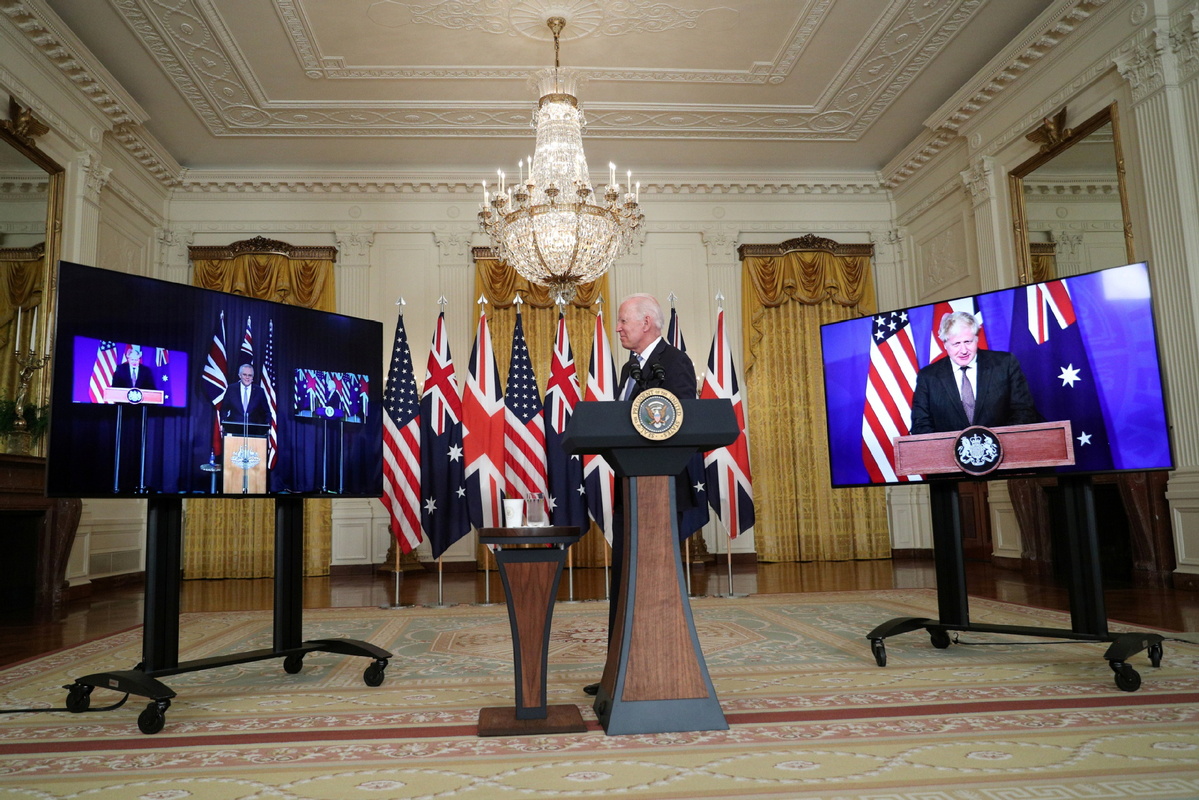ASEAN alarmed over trilateral military pact
By YANG HAN and PRIME SARMIENTO in Hong Kong | China Daily Global | Updated: 2021-10-27 09:33

The trilateral security partnership AUKUS will not only undermine regional peace and stability and affect the outlook of the Association of Southeast Asian Nations but also expose the double standards of some countries, said experts in a seminar on Tuesday.
At the New Inclusive Asia Dialogue 2021 that was held online, Ong Tee Keat, chairman of the Centre for New Inclusive Asia in Malaysia, said AUKUS, which aims to empower Australia's naval forces with nuclear-powered submarines, will turn the near waters of the ASEAN region, especially the South China Sea, into a conflict zone.
Xu Bu, president of the China Institute of International Studies, said though it is known that the AUKUS is aimed at containing China, blocking Chinese development and separating China from ASEAN countries, it is the countries in the region that are going to suffer.
AUKUS, the military pact of the United States, the United Kingdom and Australia, was announced on Sept 15, with the delivery of a nuclear-powered submarine fleet to Australia as its first major initiative.
"The (South China Sea) issue could be amicably (discussed) between China and the ASEAN member states through diplomatic means," said Ong, noting the three-decadelong dialogue partner relations between the two sides have built maturity, confidence and mutual trust in resolving the matter without recourse to external intervention.
Regional countries have been trying to stay neutral and avoid being aligned with any great power for the sake of peace, stability and development, Xu said. The former Chinese ambassador to ASEAN added that the move to transfer nuclear technology to Australia will bring the arms race to countries concerned, and the trilateral security partnership will escalate tension in the region.
Surasit Thanadtang, director of the Thai-Chinese Strategic Research Center at the National Research Council of Thailand, said the security pact exposed the double standards of the US and the UK on nuclear nonproliferation.
"This decision will pose a risk of proliferation of nuclear material and technology and will have an impact on the global nuclear nonproliferation regime," said Surasit, adding that the nuclear submarine cooperation under AUKUS involves transferring weapons-grade uranium of over 90 percent fissile purity to Australia.
Most urgent needs
"Rather than having nuclear-powered submarines, why not marine research for humanitarian and disaster relief in the region?" asked Surasit, noting that issues like counterterrorism, transnational crime in the sea and green development are among the most urgent needs in the Asia-Pacific.
Ma Bo, research fellow at the Collaborative Innovation Center of South China Sea Studies in Nanjing University, said AUKUS has further marginalized the ASEAN centrality as it forces ASEAN countries to abandon its hedging strategy and pick sides between China and the US.
Kuik Cheng-Chwee, head of the Centre for Asian Studies at the National University of Malaysia's Institute of Malaysian and International Studies, said Southeast Asia's actions on AUKUS will depend on how the US-China relationship and US politics and policy will evolve.
"If the US, for example, makes it clear that the policy is really about containment, I do not think there will be any takers from Southeast Asia," Kuik said.























